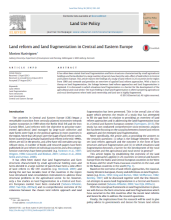/ library resources
Showing items 1 through 8 of 8.Abstract With an estimated 50% of global land held, used, or otherwise managed by communities, interfacing indigenous, customary, and informal land tenure systems with official land administration systems is critical to achieving universal land tenure security at a global scale.
A vast array of trends and innovations, such as drones and person-to-person trust solutions, have been proposed to revolutionize the task of recording land and property rights.
Ethiopia has implemented one of the largest, fastest and least expensive land registration and certification reforms in Africa.
Societal drivers including poverty eradication, gender equality, indigenous recognition, adequate housing, sustainable agriculture, food security, climate change response, and good governance, influence contemporary land administration design.
Since around 2011 pilot projects to innovate land tenure documentation are being implemented in various countries in the global south in order to address the shortcomings of formal land registration.
Tropical forests in Indonesia are subject to major transformation processes from native forests to other land uses, including rubber agroforestry as well as rubber and oil palm plantation systems.
Land policies are formulated with the goal of addressing land use management challenges. Therefore, a thorough investigation is required to assess effectiveness of land policy processes.
It has often been stated that land fragmentation and farm structures characterized by small agricultural holdings and farms divided in a large number of parcels have been the side-effect of land reform in Central and Eastern Europe.
Land Library Search
Through our robust search engine, you can search for any item of the over 73,000 highly curated resources in the Land Library.
If you would like to find an overview of what is possible, feel free to peruse the Search Guide.



